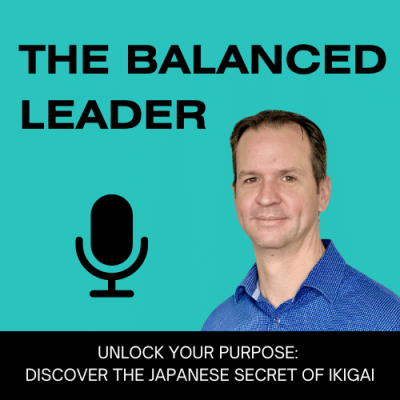Are you stuck in a job that feels like a daily grind? You’re not alone. In this weeks episode of The Balanced Leader Podcast, I dive into the fascinating Japanese concept of Ikigai – your reason for being. I’ll show you how this powerful idea can revolutionise your approach to work and life, potentially transforming your career from a source of stress to a path of genuine satisfaction and purpose. We’ll explore the four key elements of Ikigai which are; what you love, what the world needs, what you can be paid for and what you are good at.
But this isn’t just theory – I’ll take you on a journey through a real-life Ikigai success story and give you practical exercises to start discovering your own Ikigai. Whether you’re a leader looking to inspire your team or someone searching for more meaning in your career, this episode is your first step towards a more balanced, purposeful professional life. By the end, you might just be looking at your Monday mornings in a whole new light.
Chapters
00:06 Introduction and Welcome
00:33 The Workforce Engagement Crisis
01:06 Introducing Ikigai
02:49 The Four Elements of Ikigai
05:12 Ikigai Case Study: Hector Garcia’s Journey
07:41 Exercises to Help You Find Your Ikigai

[00:00:06] This is the Balanced Leader Podcast, the podcast that helps leaders elevate their wellbeing and create healthier workplaces. My name is Rob Hills, and I am your leadership and wellbeing coach. Are you someone who doesn’t really love their job? Or maybe you’re someone who starts dreading going to work on Sunday afternoon, before Monday has even arrived.
[00:00:34] I’m not saying this to make you feel bad. Don’t worry, you’re definitely not alone. According to Gallup’s State of the Global Workplace 2022 report, only 20 percent of Australian employees are actually engaged at work. So this means that 80 percent of workers are either not engaged or actively disengaged.
[00:00:56] So if this sounds like it may be you, you may want to pull the car over, grab a paper and pen, and take some notes. Because today, we’re diving into a concept that may just revolutionize the way you approach your work and your life. It’s called Ikigai, and no, I’m not swearing at you in a foreign language, I swear. I promise.
[00:01:12] Ikigai is a Japanese concept that roughly translates to reason for being. It’s the sweet spot where your passion, mission, vocation, and your profession intersect. To help you visualize what this looks like, imagine a Venn diagram with four circles that all overlap. In one circle we have what you love, what In another circle we have what the world needs, the next circle is what you can be paid for, and the fourth circle is what you’re actually good at.
[00:01:50] Where all these circles come together and overlap, that’s your Ikigai. That’s your sweet spot. So why should we even care about Ikigai as leaders? Ikigai offers a powerful framework for enhancing mental health and well being, which, if you put it to use, can lead to increased job satisfaction, reduce stress and anxiety, and it even improves self esteem.
[00:02:17] By encouraging self reflection and a little bit of mindfulness, Ikigai promotes a more balanced approach to life, which enhances our ability to navigate challenges with resilience and purpose. By helping us focus on what truly matters, and by bringing more positive emotions into our daily life, Ikigai offers a path to a more fulfilling and mentally healthy existence.
[00:02:43] Sounds alright, doesn’t it? Let’s see if we can’t try and kick off a journey to help you find your Ikigai, if you haven’t found it already. So let’s break it down a little and see if we can figure this all out. The first point is what you love. This is about your passion. What gets you out of bed in the morning?
[00:03:02] Besides that triple shot flat white. What tasks do you look forward to doing? Understanding this can help you infuse more joy into your work. Doing more of what we enjoy helps us get into a state of flow where we forget time and things seem to happen effortlessly. The second is what the world needs. Now this is your mission.
[00:03:25] How can what you do every day make a difference? This doesn’t mean we all have to be doctors, or eco warriors, or whatever. It still has to line with the other three areas. If you’re passionate about recycling, maybe you can be an eco warrior. But if it doesn’t get you excited, then it’s probably not for you.
[00:03:44] The world needs your skill, whatever that skill is. Number three is what you can be paid for. This is your vocation. Let’s face it, we all need to keep the lights on. But this isn’t just about chasing the almighty dollar. It’s about finding a way to monetize your skills in a way that aligns with your values.
[00:04:05] For me, I found this one the most challenging. You can be pretty good at something, but sometimes it’s only the best of the best that make any real money. But that’s not always the case for everybody. And lastly is what you’re good at, and this is your profession. So what skills have you honed over the years?
[00:04:24] What do people come and ask you for your advice about? This is where your expertise shines. Often this is where a critical friend may come in handy, because sometimes we don’t see the things that we’re really great at, or we’re too modest to admit them. To discover our icky guy, we need to find something that ticks all those boxes.
[00:04:45] Unfortunately, two or three out of the four may not quite get us there. I understand that for some of you though, you may feel stronger in two or three of those areas, and that’s completely normal. The fourth bucket just can’t be completely empty. It has to have something in it. I want to share a real life example of how Ikigai can transform a career.
[00:05:06] Enter Hector Garcia, a bloke who went from stressed out IT professional to best selling author and researcher. Talk about a career 180, right? Garcia was grinding away in the tech world when he stumbled upon this concept of Ikigai during a trip to Japan. He realized his current job ticked the boxes of what he was good at and what he could be paid for, but it was missing the crucial elements of what he loved and what the world needs.
[00:05:36] Does this sound familiar to anyone? Garcia’s passion was actually in writing and exploring different cultures. He was fascinated by the wisdom and the lifestyle of the Japanese, particularly their approach to finding purpose and happiness. That’s when he decided to take a leap of faith. He left his cushy IT job and dove headfirst into researching and writing about Ikigai.
[00:06:01] Was that scary? You bet. But Garcia knew he had to give it a crack. What was the result? Well, Garcia co authored the book, Ikigai, the Japanese secret to a long and happy life, which actually became an international bestseller, and funnily enough, is the basis for this podcast. Suddenly, he found himself in that sweet spot, where all four elements of Ikigai intersected.
[00:06:28] He was doing what he loved. He was writing and researching. He was doing what he was good at, which was analyzing and communicating ideas. He was doing what the world needed, which is insights on finding purpose and happiness. And he was doing what he could be paid for, which was writing and selling books.
[00:06:46] He now makes his living as a full time author, and he’s happier than ever. Garcia’s story shows us that finding your icky guy isn’t just some lofty ambition. It can lead to concrete, positive changes in your life and your career. But it’s about having the courage to reflect on what truly matters to you, and then taking some action to align your work with those values.
[00:07:12] And I’m not saying you need to quit your job tomorrow and write a bestseller. It’s not as easy as it sounds. Trust me, I know, I’ve tried it. But Garcia’s journey is a great example of how understanding and applying the principles of Ikigai can lead you to a more fulfilling career and life. The caveat here is that finding your icky guy isn’t like instant coffee.
[00:07:35] It’s going to take some time and reflection. Hence, we’ve just covered reflective practice a couple of weeks ago to prime you for today’s episode. Here are a few exercises you can use to get you started. Number one, reflect on your peak experiences as a leader. What were you doing? What made them meaningful?
[00:07:55] Number two, ask your team or friends what they think your strengths are. Sometimes others see qualities in us that we overlook ourselves. And sometimes we’re a little bit modest in this space. Number three, think about the legacy you want to leave. How do you want to be remembered as an individual? What do you want to have given society?
[00:08:15] Number four, consider what problems in your industry or society you’re passionate about solving. What are the things that keep you awake at night? What are the things that you can talk to your friends about for hours? And number five, what was it that you were doing last time you were in a true flow state?
[00:08:32] Remember, your icky guy isn’t set in stone. As you grow and evolve as a person. So too might your sense of purpose. The key is to stay curious and open to new possibilities, wherever they take you. By aligning your leadership with your Ikigai, you’re not just becoming a more effective leader, you’re becoming a more fulfilled human being.
[00:08:54] And let’s be honest, nobody wants to work with a grumpy, unfulfilled boss. So, I want you to take some time this week to ponder your Ikigai. It may just be the key to unlocking a new level of satisfaction in your life. That’s it for today’s episode, I really hope you enjoyed it. If you are on the journey to find your Icky Guy and need a bit of help, feel free to reach out, and hopefully I can give you a steer in the right direction.
[00:09:19] Enjoy the rest of your day, and I look forward to speaking with you next episode.
